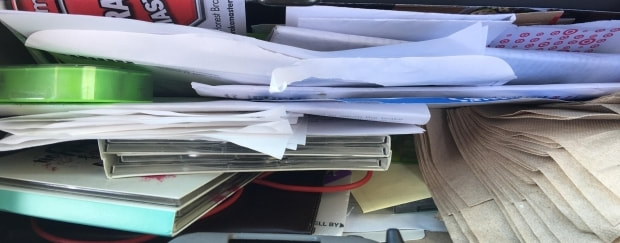|
This is one of a pair of blogs - see also Clearing after bereavement: My story
Clearing after bereavement is hard. It’s full of triggers and tough memories and it's not something we ever imagined ourselves to have to do. Don't feel guilty clearing things out. This is your home, and is where you need to feel comfortable living. There is no single right time for doing it. For some people, sorting out a partners' belongings happens the day after the death, for some it takes years, for others, it never happens. It also doesn't always happen all at once – it could be in two goes, or six goes, or ten goes, or sometimes a lifetime of goes. I did some sorting, got rid of some clothes and changed the layout of the bedroom, but it took about two years, the death of a friend, and a global pandemic for me to tackle it properly. I did the clearing on my own, as it meant that I could work at my own speed, and not have to stop to explain things or answer questions. I did have a couple of friends on hand who I could message for support, or to show pictures of my progress. I also took frequent breaks as it was both physically and emotionally exhausting. But it's not the same for everyone – you might want to call in a friend or a family member for practical help, or just moral support. For some people, the process has to involve other people. This can be hard, and will need a lot of conversations and patience from everyone involved. When you start clearing, divide things into categories:
Break the process down into manageable tasks, and start with the things with the fewest memories attached to them. Do an hour a day or a day a week, and tackle it room by room, or even cupboard by cupboard. Step away for a bit whenever you need to – go for a walk, have a nap, watch or listen to something. If you are not working to a deadline, don't feel rushed – if you're not sure about whether to keep something or get rid of it, put it away until the next round of clearing. Some people will be under a deadline to sort things out – there may be a date to leave the property, or there may be pressure from other family members. If you have this kind of stress, enlist friends to help and to support you. Create a memory box for things you want to keep but don't want to see every day, and take photos of things that are important memories, but you don't want to keep. Be prepared for the grief attacks. And for the unexpected. But also, enjoy the happy memories. However hard it is, decluttering and rearranging your home can be a very positive experience. I found that it helped me to process my grief, which I didn't expect, and to reclaim the house as my home. Clothes and jewellery
Toiletries
CDs, DVDs, games and books
Phones, tablets and computers
Electrical equipment
Other items
0 Comments
Leave a Reply. |
AuthorI was widowed at 50 when Tim, who I expected would be my happy-ever-after following a marriage break-up, died suddenly from heart failure linked to his type 2 diabetes. Though we'd known each other since our early 20s, we'd been married less than ten years. Archives
July 2024
Categories
All
|



 RSS Feed
RSS Feed